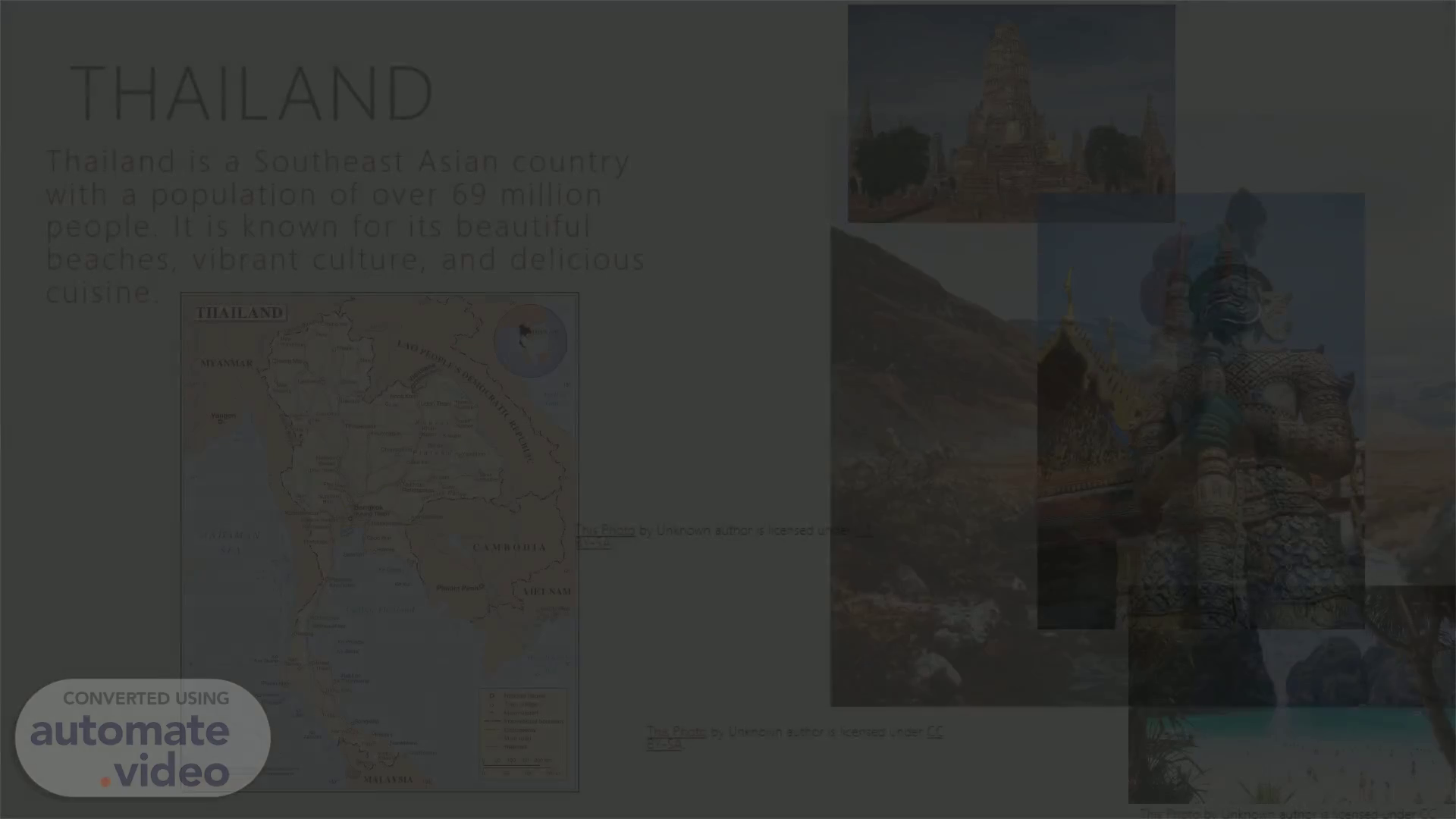Scene 2 (58s)
[Audio] Thailand has a rich history and culture, with influences from neighboring countries and the West. It was previously known as Siam and was ruled by various monarchs for centuries until it became a constitutional monarchy in 1932. Today, Thailand is a popular tourist destination, with millions of visitors coming to explore its stunning natural landscapes, bustling cities, and unique cultural experiences..
Scene 3 (1m 25s)
[Audio] Thailand is also a major exporter of rice, rubber, and other agricultural products, and its economy has been growing rapidly in recent years. However, the country still faces challenges related to income inequality, political instability, and human rights issues..
Scene 4 (1m 46s)
[Audio] Foreign Policy: Thailand has historically maintained a policy of neutrality and non-alignment in international affairs. They have strong relationships with neighboring countries in Southeast Asia and major powers such as the United States, China, and Japan. Thailand is a member of the Association of Southeast Asian Nations (ASEAN) and participates in regional diplomacy and economic cooperation..
Scene 5 (2m 15s)
[Audio] Thailand is a founding member of ASEAN and plays an active role in the organization, advocating for greater regional integration and cooperation. The country has also been involved in peacekeeping operations and humanitarian assistance efforts in conflict-affected areas, such as in neighboring Myanmar..
Scene 6 (2m 34s)
[Audio] Thailand's foreign policy priorities also include promoting economic growth and trade, with a focus on expanding its markets in the region and beyond. The country has been actively pursuing free trade agreements with a number of countries, including the United States, China, and Japan..
Scene 7 (2m 54s)
[Audio] Foreign Policy: Thailand has historically maintained a policy of neutrality and non-alignment in international affairs. They have strong relationships with neighboring countries in Southeast Asia and major powers such as the United States, China, and Japan. Thailand is a member of the Association of Southeast Asian Nations (ASEAN) and participates in regional diplomacy and economic cooperation..
Scene 8 (3m 22s)
[Audio] Thailand's economic policy is aimed at achieving sustainable and inclusive economic growth and development, with a focus on promoting innovation, enhancing competitiveness, and reducing inequality..
Scene 9 (3m 38s)
[Audio] The government's economic policies are implemented through the National Economic and Social Development Plan (NESDP), a five-year plan that outlines the country's development priorities and strategies. The current NESDP, covering 2017-2021, emphasizes the development of the Eastern Economic Corridor (EEC) as a hub for high-tech industries, infrastructure development, and investment promotion..
Scene 10 (4m 6s)
[Audio] Thailand's economy is largely export-oriented, with exports accounting for a significant share of GDP. The country's main exports include electronics, automobiles, and agricultural products such as rice and rubber. The government has been promoting the development of new industries, such as renewable energy and digital technology, to diversify the country's export base and enhance its competitiveness..
Scene 11 (4m 34s)
[Audio] To attract foreign investment, the government has implemented a number of policies to improve the business environment, including measures to streamline regulations and reduce bureaucracy. The country has also been promoting regional economic integration through its participation in free trade agreements, including the ASEAN Free Trade Area and the recently established Regional Comprehensive Economic Partnership (RCEP)..
Scene 12 (5m 0s)
[Audio] Despite these efforts, Thailand still faces challenges related to income inequality, labor productivity, and the need to upgrade its infrastructure. The government has launched a number of initiatives to address these issues, including programs to provide skills training to workers and to improve the quality of education..
Scene 13 (5m 20s)
[Audio] Diversification of the economy through the development of new industries such as renewable energy and digital technology Attraction of foreign investment through improved business environment and participation in free trade agreements Strong export-oriented economy with a significant share of GDP coming from exports.
Scene 14 (5m 43s)
[Audio] Promoting innovation and enhancing competitiveness to achieve sustainable economic growth and development Development of the Eastern Economic Corridor (EEC) as a hub for high-tech industries, infrastructure development, and investment promotion Investment in education and skills training programs to address issues related to income inequality and labor productivity..
Scene 15 (6m 8s)
[Audio] Advantages of Policies: Thailand has experienced significant economic growth and poverty reduction in recent decades. Their foreign policy has allowed them to maintain positive relationships with a wide range of countries, which can facilitate trade and investment opportunities. The emphasis on tourism and other industries has created jobs and increased economic opportunities for many Thai people. Disadvantages of Policies: The reliance on exports can leave Thailand vulnerable to external shocks, such as global economic downturns. Some foreign investors have expressed concerns about corruption and regulatory barriers in Thailand, which could hinder investment. The emphasis on tourism and other industries can also lead to environmental degradation and exacerbate inequality within the country..
Scene 16 (7m 3s)
[Audio] Active engagement in the region and beyond to promote regional stability, economic growth, and cooperation Strong diplomatic relations with neighboring countries and partnerships with countries in other regions, such as the United States, Europe, and the Middle East Founding member and active participant in ASEAN, advocating for greater regional integration and cooperation..
Scene 17 (7m 29s)
[Audio] Involvement in peacekeeping operations and humanitarian assistance efforts in conflict-affected areas, such as in neighboring Myanmar Promotion of economic growth and trade through free trade agreements and investment promotion policies..
Scene 18 (7m 45s)
[Audio] Challenges related to political instability and changes in leadership, which can affect the continuity of the country's foreign policy. Tension with neighboring countries over territorial disputes and other issues, such as the ongoing conflict in Myanmar Need to balance its relationships with major powers such as the United States and China, which can have different interests in the region Criticism from human rights groups over the country's handling of human rights issues, particularly with regards to the treatment of refugees and asylum seekers..
